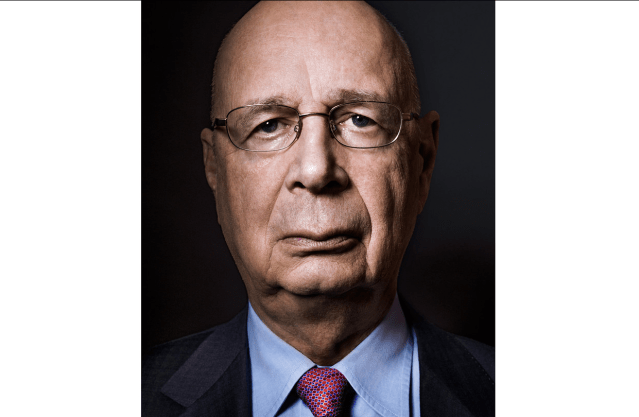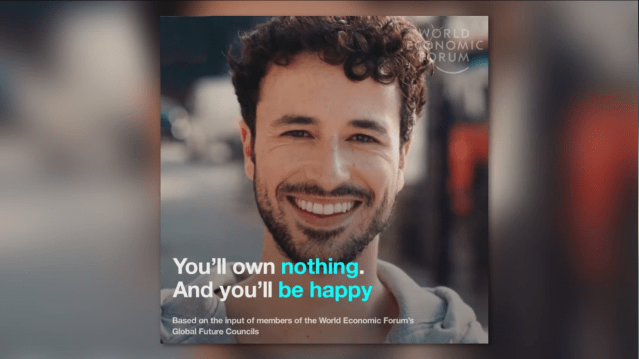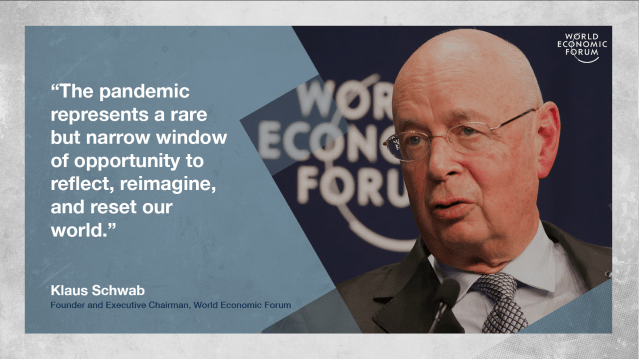The Great Reset and World Economic Forum: An In-Depth Look at the Concerns and Criticisms
The COVID-19 pandemic led to widespread economic disruption and social upheaval, prompting calls from the elite for a reevaluation of global systems and structures.
One such initiative is the Great Reset, a project spearheaded by the World Economic Forum (WEF) and its founder and executive chairman, Klaus Schwab.

The Great Reset allegedly aims to build a more sustainable, equitable, and resilient future; using the pandemic as an excuse to implement it.
However, the initiative has rightfully faced criticism and concern from those who know it threatens individual freedoms, economic prosperity, and national sovereignty.
In this article, we will explore the key criticisms and concerns surrounding the Great Reset and the WEF, as well as the potential implications for global governance and society.
Let’s not lose touch…Your Government and Big Tech are actively trying to censor the information reported by The Exposé to serve their own needs. Subscribe now to make sure you receive the latest uncensored news in your inbox…
The World Economic Forum and the Great Reset
The WEF is a nonprofit organization that brings together the elite, from business leaders to government, academia, and civil society to discuss and address global challenges.
The organization claims its mission is to “improve the state of the world by engaging business, political, academic, and other leaders of society to shape global, regional, and industry agendas.”
The WEF’s initiatives include topics such as the climate change scam, global health, and economic inequality.
We are told that The Great Reset was first proposed by Klaus Schwab in 2020, as a response to the COVID-19 pandemic and the need for a more sustainable, equitable, and resilient global system. But this isn’t true. Klaus Schwab had already launched The Great Reset years previously and decided to use the COVID-19 con to relaunch it.
The project allegedly seeks to leverage the disruption caused by the pandemic to accelerate progress towards the United Nations’ Sustainable Development Goals and the Paris Agreement on climate change. Key components of the Great Reset include the adoption of sustainable technologies, the promotion of stakeholder capitalism, and the rethinking of global governance structures.
One of its mantras is that ‘you will own nothing and you will be happy’.

Criticisms and Concerns
- Centralization of Power and Elitism
One of the primary criticisms of the Great Reset and the WEF is the perception that they represent a centralization of power and decision-making in the hands of a small, elite group of unelected individuals.
Critics correctly argue that the WEF’s membership is dominated by wealthy and influential corporations and individuals, who prioritize their own interests over those of the global population.
- Threat to National Sovereignty
Critics also correctly argue that the Great Reset and the WEF pose a threat to national sovereignty, as they seek to promote global governance structures that undermine the authority of individual nations.
This concern is particularly prevalent among those who view globalization as a threat to cultural identity and national autonomy.
- Economic Impact and Inequality
The Great Reset’s emphasis on sustainable technologies and stakeholder capitalism has also drawn criticism from those who rightfully fear that it will exacerbate economic inequality.
Critics correctly argue that the transition to the WEF’s version of a sustainable economy will disproportionately impact low-income individuals and countries, who may lack the resources to adapt to new technologies and business models.
- Technocratic Governance
Finally, critics have expressed concerns about the potential for the Great Reset to lead to a more technocratic form of governance, in which decisions are made by so-called “experts”, and technocrats rather than by elected officials. This concern is rooted in the fact that such a system will lack democratic accountability and transparency.

Implications for Global Governance and Society
The criticisms and concerns surrounding the Great Reset and the WEF have important implications for global governance and society.
As the world continues to grapple with the challenges posed by the COVID-19 scamdemic and the alleged need for a more sustainable future, it is crucial to address these concerns and ensure that any proposed solutions are grounded in democratic principles and accountability, instead of communism and authoritarianism.
Conclusion
In conclusion, the Great Reset and the World Economic Forum have generated grave concern among the general public.
While the initiative claims to seek to address pressing global challenges, it has faced criticism for its elitism, threat to national sovereignty, potential economic impact, and technocratic governance.
As we navigate the complex landscape of global governance and societal change, it is essential to engage in open and transparent dialogue about these concerns and work towards solutions that prioritize democracy, equity, and sustainability.
After all, do you see yourself living in a world where ” you own nothing and be happy about it”?
This article has been archived for your research. The original version from The Exposé can be found here.



